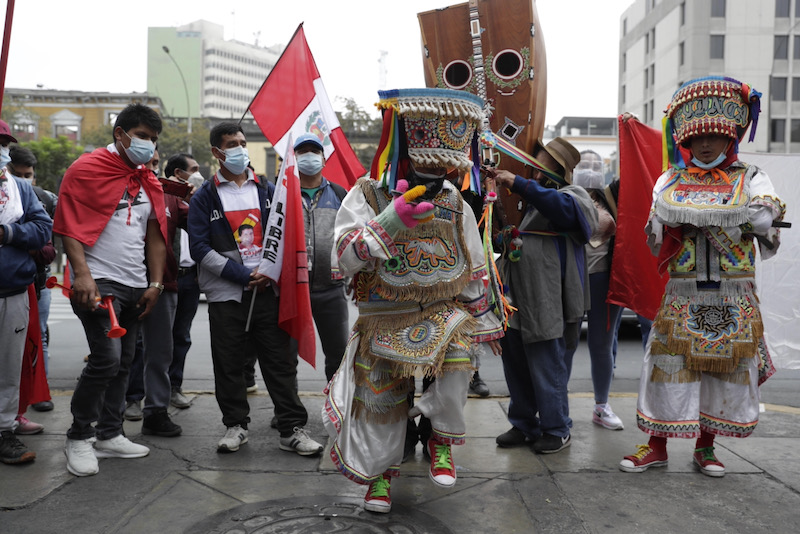Sixteen people were killed in the town of San Miguel del Ene, Peru, on Monday 24 May. A splinter faction of the Shining Path terror group, who fought the Peruvian government throughout the 1980s and 1990s, is suspected to be responsible for the massacre. Peruvian authorities say that remaining members of the Shining Path have turned to drug trafficking in the country’s coca-producing region. The massacre came in the days leading up to the 6 June run-off election for president. Keiko Fujimori of the right-wing Popular Force party faces off against left-wing Pedro Castillo of the Peru Libre party. Fujimori is the daughter of former president Alberto Fujimori, who is serving a prison sentence for human rights abuses. The Peruvian Episcopal Conference wrote, “The Church condemns terrorism and violence, wherever it comes from.”
On 6 June, voters in Mexico were due to elect senators, mayors, and governors in what authorities have called the biggest elections in the country’s history. The vote was the most significant test yet of President Andres Manuel Lopez Obrador, who was elected in 2018, and his Morena party. The campaign season has been marked by violence, with 34 candidates killed around the country. Monterrey Archbishop Rogelio Cabrera López, president of the bishops’ conference, urged Mexicans to vote, saying that, “Mexico must walk in healthy pluralism, but always working in unity. For this it is important that we participate.”
Friday 28 May marked one month since the start of ongoing protests in Colombia. The protests began in response to tax increases that have since been rolled back. More than 40 people have been killed and excessive use of force by the police has been widely documented. On Friday night in Cali, five people were killed. On Saturday, President Ivan Duque deployed the military to the city, which has been the epicentre of the protests. The Archdiocese of Cali repudiated the violence and released a statement on Friday, saying, “Every person who dies represents a family waiting for them and a people who hope to live in peace with truth and justice.”
The Catholic Church in Zimbabwe has added its voice to an escalating row over whether the remains of the late President, Robert Mugabe, should be exhumed and reburied. A traditional chief last week ordered former First Lady, Grace Mugabe, to exhume her husband’s remains at the family cemetery in Mashonaland West and rebury them, claiming the late president was laid to rest in a place violating the area’s burial cultural norms. According to reports, the traditional court in Kutama village has ruled that Mugabe’s remains should be reburied in Zimbabwe’s capital, Harare, at the National Heroes’ Acre cemetery by 1 July.
A spokesperson for the Southern African Catholic Bishops’ Conference, Fr William Slattery, said Mugabe was a devoted Catholic who had close relations with the Church. He said should the family decide to move his remains, prayers would need to be undertaken by a priest before and after the exhumation.
The Catholic Church in Mali has strongly condemned what it has a called a “seizure of power outside of the democratic process” after Colonel Assimi Goïta declared himself interim president on 24 May, two days after seizing power in the West African nation’s second coup in nine months. Transitional President, Bah Ndaw, and Prime Minister, Moctar Ouane, were detained by soldiers and later released after resigning their positions. In a collective statement circulated on 27 May, the members of the Episcopal Conference of Mali said they are following “with great concern and sadness the events that took place in the country following the establishment of a new government”. The statement, signed by conference President, Bishop Jonas Dembélé, urges a constructive dialogue and a “social truce” to put an end to the crisis.
Brazilian Catholic Priest, Fr Edegard Silva, has been leading an initiative providing psycho-social support to children displaced by Islamist violence in the Cabo Delgado region of Mozambique at a reception camp in Metuge outside Pemba using puppets. “These children have witnessed horrible things in their homes before they fled to the camp, including the deaths of their parents, siblings, friends and neighbours,” Silva told ACI Africa. “It [the puppet show] is therapy and entertainment, something informal... It is very simple," Silva continued. More than 2,700 people are thought to have died and more than 670,000 been displaced due to ongoing violence in the oil-rich region of Northern Mozambique. The Catholic Archdiocese of Nampula has also been assisting those forced to flee their homes providing clothing, blankets, food and other supplies to the more than 60,000 people living in Nampula in temporary camps. The Archdiocese is also to provide shelter for 3,000 people in a housing project supported by the Southern African Catholic Bishops’ Conference. “The situation is becoming bad to worse, especially with the new cases of cholera,” said Nampula Archbishop Saure, noting that the number of children at the camps was overwhelming. “We are trying to avert the situation by providing shelter, food and emotional support.”
Zambian Church leaders, in a document jointly signed by George Lungu, President of the Zambia Conference of Catholic Bishops, and leaders of the Council of Churches in Zambia and Evangelical Fellowship of Zambia have said in the run up to the 12 August elections that the Church must remain non-partisan and “avoid receiving gifts that have the potential to make it lose its prophetic voice”. The statement notes that politicians, particularly from the ruling party, have already started “crisscrossing” the country to make donations in churches and parishes. The statement warns that the Church is wary of anything in the politicians’ conduct that may damage its ability to speak “truth to power” and confirmed that the church remains committed to playing a “reconciliatory and peace-building role” in the country. With an estimated 95.5 per cent of the country declaring themselves Christian, the Zambian Church has a powerful voice in the Southern African Nation, where the August elections are likely to see a fierce contest between between incumbent President Edgar Lungu of the ruling Patriotic Front (PF) party and the United Party for National Development (UPND) led by rival, Hiakande Hichilema.
The Louvre in Paris will open a new department dedicated to the art of Byzantium and Eastern Christians, its new director Laurence des Cars announced. The museum, which already has separate sections for Islamic, Egyptian and Oriental art, but its extensive holdings of Eastern Christian art “was lost, if I can put it that way, in many different departments at the Louvre,” she told French radio. “This is a magnificent collection that deserves a department for itself.” France has historically considered itself a protector of Christians in the Middle East. A new Louvre section has been under discussion for about a decade and picked up support after the success of an exhibition entitled "Christians of the Orient: 2000 Years of History" in late 2017 at the Arab World Institute in Paris. But it took the nomination of a new director to decide to rearrange collections for a new department. Raphaëlle Ziadé, who curated the 2017 exhibition, said the new department could promote cooperation with museums in the region to save what can be preserved of the artwork Christian communities built up over the centuries. “A whole heritage is in danger there, with destruction, theft and illicit trafficking,” she said. “An urgent inventory of icons from the whole region should be carried out.”
On 1 July, Pope Francis will welcome the main Christian leaders of Lebanon to address what he described as the “worrying” crisis the country is going through. He has promised to visit Lebanon if its politicians agree on a new government. Comece, the association of Catholic bishops in the European Union, has urged the EU to support Lebanon in its struggle to save its identity and social fabric amid a series of multiple crises. It made the appeal after Catholic patriarchs and bishops in Lebanon told Comece President Cardinal Jean-Claude Hollerich in a letter that their country's unique multireligious balance was under severe strain from recent crises including the August 2020 explosion in Beirut port and the Covid-19 pandemic. They also asked European churches to support local Christian communities which “serve all citizens without distinction or discrimination and will continue to work ceaselessly for the common good”. The World Bank recently said that Lebanon, which has not been able to form a government for eight months, “is going through a severe and prolonged economic depression” with no end in sight this year.
Myanmar’s military in the early hours of Monday 24 May fired artillery shells at a Catholic Church in eastern Myanmar, killing four civilians sheltering there. Sacred Heart Church in Kayanthayar Parish near Loikaw, the capital city of Kayah state, was the target of the attack. All those killed and eight others wounded were Catholics.
Fr Stan Swamy SJ, 84, the Jesuit, activist and defender of the rights of indigenous peoples who was incarcerated on 9 October last year in Taloja prison, Mumbai, India, is now ill with the symptoms of Covid-19, according to Jesuit Missions. Fr Swamy, who has advanced Parkinson’s disease and is hearing-impaired, is in an overcrowded prison in which several staff are reported to have the virus.
The Norbertine abbey at Grimbergen, just north of Brussels, has resumed brewing beer after a gap of more than two centuries caused by invading French troops in the 1790s. The monks, who in 1958 sold their name to a Belgian brewery that has since made the commercial Grimbergen beer sold across Europe, have opened a microbrewery on their premises to produce three special varieties combining medieval recipes and modern techniques. They follow traditional Trappist rules that it be produced within the abbey walls, overseen by monks and their profits must go for abbey expenses and charitable causes. Since they are not Trappists, the monks cannot use the sought-after “Trappist abbey beer” label. Sub-prior Karel Stautemas did his brewery training in Copenhagen, where one owner of the commercial brand is located. The Danish beer giant Carlsberg oversees production and sales of Grimbergen outside of Belgium. The abbey, founded in 1128, now produces three of its own beers, Astrum Pale ale at 6 per cent, Magnum Opus Brut at 8 per cent and Ignis Quadruple at 10 per cent.



 Loading ...
Loading ...